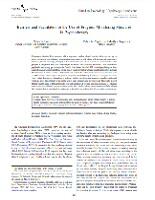Fitzpatrick, Marilyn
Person Preferred Name
Marilyn Fitzpatrick
Related Works
Content type
Digital Document
Abstract
The use of Progress Monitoring (PM) measures has been shown to improve outcomes in therapy for clients who do not follow the normal trajectory of improvement. In addition to improved outcomes, there are several other documented benefits of PM that may motivate clinicians to use PM. Research has examined the broader field of selecting mental health care quality assessment tools and a review of the literature has pointed to the importance of considering motivation for assessment when selecting a measure. However, how motivation influences the selection or maintained usage of PM measures has not been studied. This study examined initial motivation as well as measure selection and continuing use of PM. Consensual Qualitative Research methodology was applied to characterize how clinicians (n = 25) started, selected, and maintained use of PM measures and how initial motivation related to measure selection and continued use. Regardless of initial motivation, convenience and effectiveness emerged as important when selecting and continuing to use a measure. Results are compared to current frameworks for selecting mental health- care quality indicators. Our results suggest that PM measures need to strike a balance, emphasizing convenience as well as efficacy in order to improve clinical uptake and adherence.
Origin Information
Content type
Digital Document
Abstract
This national survey investigated the clinical practice of psychologists in Canada with particular reference to the usage of progress monitoring (PM) measures. Data from 1,668 registered psychologists were collected on demographic characteristics, years of experience, years since graduation, degree, professional activities, primary clientele, theoretical orientations as well as familiarity with PM measures, usage of PM measures, and usage of other methods to monitor client progress. Survey results indicated that more than 2 thirds of psychologists were unfamiliar with PM measures and only 12% of psychologists were using these measures. Profiles of psychologists based on awareness and usage of PM measures are presented. Implications for practicing clinicians are discussed.
Origin Information
Content type
Digital Document
Abstract
Progress-monitoring (PM) measures, which help ensure evidence-based practice, allow the tracking of client progress in psychotherapy treatment and even predict which clients will have negative outcomes. However, the majority of psychologists in Canada still do not use these measures in clinical practice. The purpose of the present study was to investigate the barriers and facilitators to the use of PM measures in psychotherapy among psychologists in Canada. Participants included 533 licensed psychologists from across Canada who responded to an online survey regarding the barriers and facilitators involved in using PM measures in clinical practice. Participants self-identified as either users, nonusers, or previous users of PM measures. The results of the present study indicate that the top-4 barriers to using PM measures were limited knowledge, limitations in training, burden on clients, and concerns regarding additional work and time. These barriers were similar across users, nonusers, and previous users. The results suggest that offering training in different formats, over extended periods of time, and from colleague to colleague may be the most effective approach to overcoming these barriers. Other strategies that may help address the identified barriers and implications for practicing clinicians and the field of psychology are discussed.
Origin Information
Content type
Digital Document
Abstract
Although integrating progress monitoring (PM) measures into psychotherapy practice can provide numerous benefits, including improved client outcomes, relatively few clinicians use these measures (e.g., Ionita & Fitzpatrick, 2014). To better understand the reasons for clinicians’ reluctance, consensual qualitative research methodology was used to examine the challenges faced by clinicians currently using PM measures. Open-ended, semistructured interviews, with 25 clinicians who chose to use PM measures, revealed that clinicians tended to face challenges involving technical concerns, negative responses from others, and personal barriers such as anxiety. The majority of participants discussed ways to overcome the challenges they experienced, including ensuring the fit of the PM measure, explaining measures to others to help engender a positive response, adapting their own perspective, and increasing their own and others’ knowledge of the measures. Implications for practicing psychologists and for knowledge translation efforts are discussed.
Origin Information




